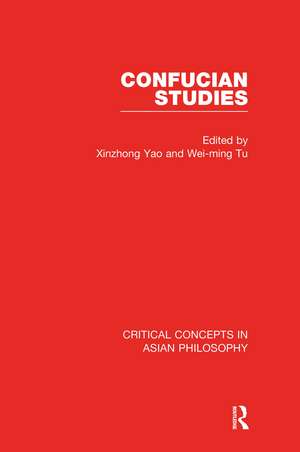Confucian Studies: Critical Concepts in Asian Philosophy
Editat de Xinzhong Yao, Tu Wei-Mingen Limba Engleză Hardback – 4 aug 2010
To some extent Confucianism can be broadly said to have started with the teaching of Confucius (551–479BC) who focused on how to restore moral and political order through education and ritual performance, although he did not see himself as the founder of a new moment, nor did he elaborate a systematic religious or philosophical doctrine. Several centuries after his death, he was elevated to the position of the Perfect Sage and Ancient Teacher (zhisheng xianshi), and gradually became one of the focuses in state sacrifices. In this way Confucianism became part of the state religion or ideology addressing the needs of government, community, family, and the self, and dominated intellectual and social life for more than 2,000 years in China, and, to a lesser extent, in other parts of East Asia.
While having substantially declined in political and social influence, Confucianism was revived by leading intellectuals (so-called Modern New Confucians) in the twentieth century to deal with perennial problems facing modern people and society. It is against this background that Confucian Studies has become an increasingly important subject taught in universities and colleges in North America, Europe, East Asia, and Australia. With more and more universities and colleges offering courses on or relating to Confucian philosophy, ethics, religion, and politics, this new collection from Routledge answers the urgent need for a source book in contemporary Confucian Studies. Volume I (‘Reassessing Confucian Traditions’) covers Confucianism in History and the focus of Volume II is on ‘Reinterpreting Confucian Ideas’. Volume III is titled ‘Reconstructing Confucian Ethics’, while the final volume in the collection brings the best scholarship on ‘Reappraising Confucian Ideals’.
Preț: 3680.19 lei
Preț vechi: 5761.61 lei
-36% Nou
Puncte Express: 5520
Preț estimativ în valută:
704.20€ • 767.33$ • 593.39£
704.20€ • 767.33$ • 593.39£
Comandă specială
Livrare economică 02-16 aprilie
Doresc să fiu notificat când acest titlu va fi disponibil:
Se trimite...
Preluare comenzi: 021 569.72.76
Specificații
ISBN-13: 9780415452151
ISBN-10: 0415452155
Pagini: 1752
Dimensiuni: 156 x 234 x 117 mm
Greutate: 3.18 kg
Ediția:New.
Editura: Routledge
Colecția Routledge
Seria Critical Concepts in Asian Philosophy
Locul publicării:Oxford, United Kingdom
ISBN-10: 0415452155
Pagini: 1752
Dimensiuni: 156 x 234 x 117 mm
Greutate: 3.18 kg
Ediția:New.
Editura: Routledge
Colecția Routledge
Seria Critical Concepts in Asian Philosophy
Locul publicării:Oxford, United Kingdom
Cuprins
Volume I: Reassessing Confucian Traditions Part 1: Traditions of Transmission Part 2: Confucian Masters Part 3: Modern Relevance Volume II: Reinterpreting Confucian Ideas Part 1: Basic Concepts Part 2: New Interpretations Part 3: Modern Reflections Volume III: Reconstructing Confucian Ethics Part 1: Systematic Ethics Part 2: Morality in Contexts Part 3: Tension in Ethic Relations Volume IV: Reappraising Confucian Ideals Part 1: Political Impact Part 2: Social Transformation Part 3: Self-Cultivation and Spirituality
Descriere
Scholars tend to see Confucianism as a historical and yet living tradition containing elements of philosophy, religion, politics, morality and education, continuing to hold a swinging power over the way and value of life in East Asia.
With more and more universities and colleges offering courses on or relating to Confucian philosophy, ethics, religion and politics, there is an urgent need for a source book in contemporary Confucian studies. This is a major reference work of essential importance to undergraduates, postgraduates and academics in Confucianism, East Asian history, philosophy and religion.
With more and more universities and colleges offering courses on or relating to Confucian philosophy, ethics, religion and politics, there is an urgent need for a source book in contemporary Confucian studies. This is a major reference work of essential importance to undergraduates, postgraduates and academics in Confucianism, East Asian history, philosophy and religion.
